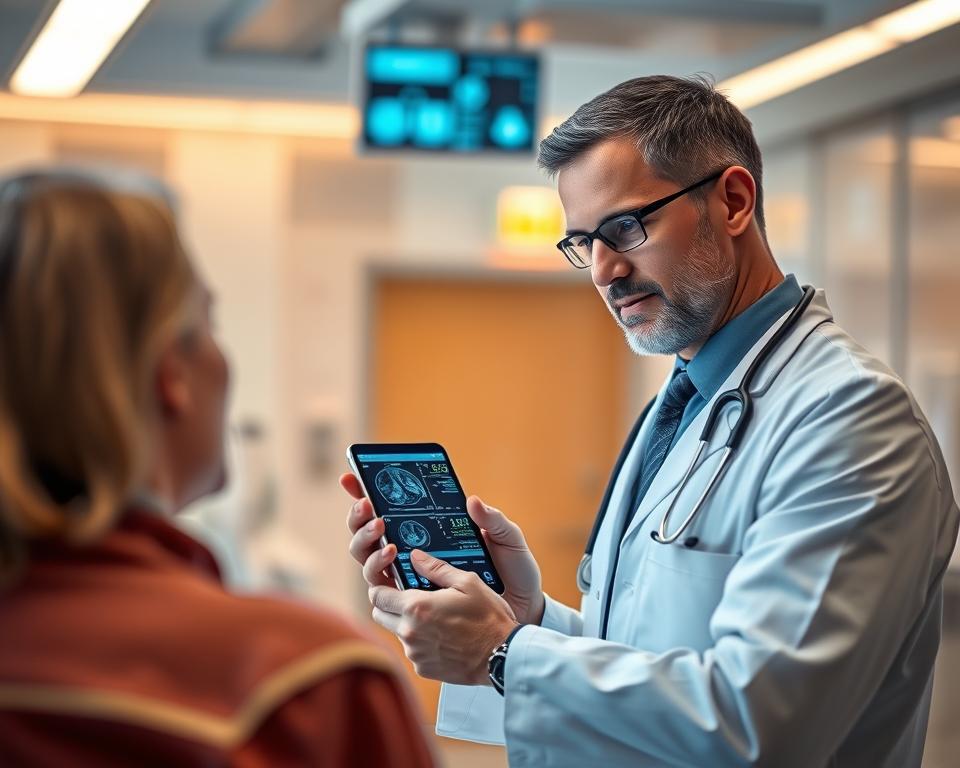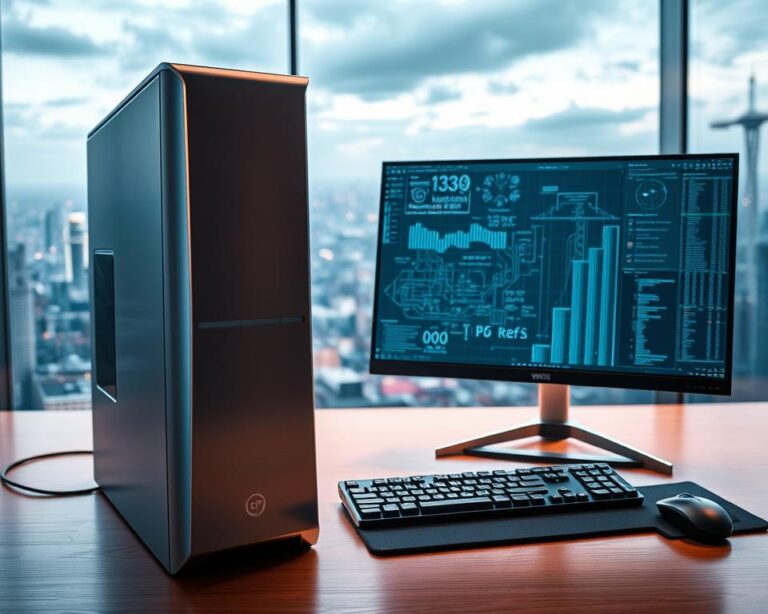
The Importance of Mobile Technology in Healthcare
Did you know that over 80% of healthcare providers believe that mobile technology significantly enhances patient care? This remarkable statistic highlights the growing recognition of the importance of mobile technology in healthcare. As digital tools become more integrated into our daily lives, their role in advancing healthcare delivery cannot be overstated. Mobile health, or mHealth, encompasses a diverse range of applications, devices, and platforms that are transforming how patients and providers interact. The mobile health benefits include improved patient outcomes, streamlined healthcare processes, and increased accessibility to vital medical information.

By leveraging innovative telemedicine advantages, healthcare providers can enhance patient engagement and foster better communication, leading to timely interventions and a more efficient healthcare system overall. It’s clear that mobile technology’s influence is reshaping the healthcare landscape, making it crucial for the industry to adapt and evolve alongside these advancements.
Key Takeaways
- Mobile technology enhances patient care and outcomes.
- A growing number of healthcare providers utilize mobile applications.
- Mobile health tools improve accessibility to medical information.
- Telemedicine streamlines communication between patients and providers.
- Healthcare mobility solutions facilitate timely interventions.
- Adapting to mobile technology is essential for the future of healthcare.
Understanding Mobile Technology in Healthcare
Mobile technology in the medical field has significantly transformed how healthcare is delivered, making it more efficient and accessible to both patients and providers. The integration of smartphones, tablets, mobile applications, and wearable devices significantly enhances healthcare mobility solutions, facilitating seamless communication and data exchange among healthcare professionals.
These technologies enable medical practitioners to access patient records, schedule appointments, and maintain real-time communication with colleagues, ensuring prompt decision-making. As mobile technology continues to advance, its role in healthcare expands, particularly concerning the secure storage and transmission of health data. This secure framework supports telemedicine and remote patient monitoring effectively.
With the rising trend of mobile health apps, patients gain greater control over their health management. These applications empower users to track vital signs, remind them about medication, and even connect with healthcare providers instantly. Such tools gather essential health data, promoting proactive healthcare measures and enhancing overall patient engagement.

Importance of Mobile Technology in Healthcare
Mobile technology revolutionizes the healthcare landscape by enhancing patient engagement and improving accessibility to vital medical information. This transformation underscores the importance of mobile technology in healthcare, making it an invaluable asset for both patients and providers.
Enhancing Patient Engagement
Through mobile applications, patients can communicate in real-time with healthcare professionals. These interactions encourage patients to take an active role in their healthcare decisions. Research indicates that patients who use mobile health applications often show higher adherence to their prescribed treatment plans. This increased involvement leads to better health outcomes and overall satisfaction with the care they receive.
Improving Accessibility to Medical Information
Mobile technology significantly enhances how patients access medical information. Applications provide essential health resources, empowering individuals to make informed decisions. With easy access to information, patients can research their conditions, understand treatment options, and manage their health more effectively. The growing trend of mobile health benefits not only boosts patient knowledge but also fosters a sense of control over their health journey.

| Feature | Mobile Health Application | Traditional Healthcare Approach |
|---|---|---|
| Patient Engagement | High interactivity and real-time communication | Limited interaction, primarily through appointments |
| Information Accessibility | On-demand health information through apps | Dependent on healthcare provider availability |
| Treatment Adherence | Increased adherence due to app reminders | Reminders often lack personalization |
| Patient Empowerment | Enhanced self-management of health | Patients often rely solely on provider instructions |
Benefits of Mobile Health (mHealth)
Mobile health (mHealth) solutions have transformed the landscape of healthcare, providing numerous advantages to both patients and providers. Among these mobile health benefits are the real-time monitoring of health metrics, improved communication channels, and enhanced convenience for patients. These features lead to better health outcomes and a more streamlined healthcare experience.
Real-Time Health Monitoring
Wearable devices and mobile apps facilitate the continuous tracking of vital health data, enabling healthcare practitioners to monitor patients proactively. This real-time health monitoring empowers providers to adjust treatments based on up-to-date information, leading to improved patient care.
Streamlined Communication Between Patients and Providers
Effective communication is critical in healthcare. mHealth enables secure messaging systems that allow patients to connect with their healthcare providers instantly. This streamlined communication ensures timely responses to inquiries and quicker interventions when necessary, which can significantly improve patient health outcomes.
Increased Convenience for Patients
Mobile health features like appointment reminders and health tracking tools offer significant convenience for patients. The ease of managing healthcare appointments and monitoring personal health metrics results in enhanced patient satisfaction, making it more likely that they adhere to treatment plans and engage with their healthcare teams.

| Mobile Health Feature | Benefit for Patients | Impact on Healthcare Providers |
|---|---|---|
| Real-Time Health Monitoring | Proactive health management | Timely adjustments to treatments |
| Secure Messaging | Instant communication with providers | Faster response times and interventions |
| Appointment Reminders | Reduced missed appointments | Better patient attendance and engagement |
Telemedicine Advantages
Telemedicine offers a range of significant benefits that reshape how patients access healthcare services. By utilizing technology, telemedicine improves healthcare delivery while ensuring affordability and convenience. These telemedicine advantages enable both patients and providers to engage more effectively, leading to healthier outcomes.
Cost-Effective Solutions for Healthcare Access
One of the most compelling telemedicine advantages is its cost-effectiveness. By reducing the need for in-person visits, patients save on transportation costs and time lost from work. Virtual consultations often come with lower fees than traditional office visits, making healthcare more accessible and affordable for those who need it. This financial relief encourages more individuals to seek care promptly, ultimately contributing to better health management.
Reducing Travel Time and Associated Costs
Another standout benefit of telemedicine is the reduction in travel time and related expenses. For patients living in rural or underserved areas, accessing healthcare services can be particularly challenging. Telemedicine bridges this gap by allowing patients to consult with health professionals from the comfort of their own homes. This convenience not only enhances patient satisfaction but also facilitates timely intervention, which can drastically improve health outcomes.

Mobile Apps for Healthcare Management
The integration of mobile apps for healthcare has significantly transformed how patients and providers manage health information. These applications enhance health outcomes through innovative features that facilitate better communication and streamline essential health tasks.
Medication Reminders and Health Tracking
Mobile apps for healthcare often include medication reminders that notify patients when it’s time to take their medications. This feature helps improve adherence to treatment plans, fostering better health management. Additionally, health tracking functionalities allow users to monitor vital signs and daily activities, providing a comprehensive view of their health over time. Such tools empower patients by keeping them informed about their conditions and encouraging proactive health management.
Appointment Scheduling and Management
Apps designed for healthcare management can simplify the appointment scheduling process for patients. Users can easily book, reschedule, or cancel appointments using these platforms, which helps reduce no-show rates. By optimizing workflow through efficient appointment management, healthcare providers can ensure that their services are accessible and convenient for patients. Streamlined scheduling contributes to a smoother healthcare experience, ultimately enhancing patient satisfaction.
Remote Patient Monitoring
Remote patient monitoring (RPM) plays a pivotal role in enhancing the management of chronic health conditions. This approach enables healthcare providers to receive real-time data about patients’ health from various tools and devices. By utilizing these technologies, both patients and providers benefit from a constant flow of vital information, which significantly improves the overall healthcare experience.
Continuous Health Monitoring Tools
RPM utilizes an array of continuous health monitoring tools, including wearable devices, mobile applications, and specialized medical equipment. These devices track critical health parameters such as blood glucose levels, heart rate, and blood pressure. This data is sent directly to healthcare professionals, allowing for ongoing assessment without the necessity of frequent in-person visits. This significantly enhances the efficiency of patient care.
Early Detection of Health Issues
One of the most noteworthy advantages of remote patient monitoring is the potential for early detection of health issues. Continuous data transmission allows healthcare providers to identify alarming trends or irregularities in a patient’s condition promptly. This proactive approach enables timely interventions and can lead to more effective treatment adjustments, ultimately improving health outcomes and patient satisfaction.
mHealth Innovations
Recent mHealth innovations have transformed the landscape of patient care, especially through wearable technology. These advancements provide valuable insights, enabling both patients and healthcare providers to engage more effectively. Smartwatches and fitness trackers have gained popularity not only for their convenience but also for their ability to continuously monitor vital health metrics.
Wearable Technology in Patient Care
Wearable technology significantly enhances patient care by allowing for consistent tracking of important health data. Devices such as heart rate monitors and sleep trackers empower users to take charge of their health. Patients can easily share this data with their healthcare providers, fostering a collaborative approach to health management. With access to real-time data, medical professionals can adjust treatment plans promptly based on patient needs. This ability to monitor health continuously leads to improved outcomes and increased patient satisfaction.
AI and Data Analytics in Mobile Health Solutions
Artificial Intelligence plays a pivotal role in the evolution of mobile health solutions. AI technologies analyze vast amounts of health data, uncovering patterns and risks that might go unnoticed otherwise. By integrating AI with mHealth innovations, healthcare providers can deliver personalized treatment plans tailored to individual patient profiles. These insights not only enhance preventive care strategies but also aid in early identification of potential health issues. The combination of AI and data analytics represents a significant leap forward in how mobile health solutions can optimize patient care.
Healthcare Mobility Solutions
The integration of healthcare mobility solutions represents a transformative step in modern healthcare practices. Cloud-based platforms play a pivotal role in enabling healthcare workers to access vital patient information in real-time. This accessibility not only enhances collaboration among professionals but also contributes significantly to improving patient care.
Cloud-Based Platforms for Healthcare Workers
Cloud-based platforms offer numerous advantages to healthcare workers. These systems facilitate seamless access to patient records, ensuring that healthcare providers have the most current information at their fingertips. As a result, patient data can be shared easily among departments, fostering improved teamwork and reducing the likelihood of errors.
Enhancing Workflow Efficiency
Incorporating healthcare mobility solutions can greatly enhance workflow efficiency. By eliminating the need for cumbersome paperwork and facilitating electronic communication, healthcare professionals can devote more time to patient care. Standardizing processes through cloud technology leads to better decision-making and shorter response times, ultimately benefiting both healthcare providers and patients.
| Feature | Traditional System | Cloud-Based Platform |
|---|---|---|
| Data Accessibility | Limited to on-site access | Accessible anytime, anywhere |
| Collaboration | Interdepartmental delays | Immediate sharing of information |
| Response Time | Slower due to manual processes | Faster with automated updates |
| Data Security | Vulnerable to physical loss | Encrypted and secure |
Utilizing cloud-based platforms ensures healthcare workers stay connected and informed, leading to enhanced patient outcomes. As healthcare continues to evolve, the adoption of these innovative solutions proves essential for effective patient management and overall service excellence.
Digital Health Tools and Their Impact
Digital health tools are reshaping the landscape of healthcare by introducing innovative solutions that replace traditional practices. These tools include electronic health records (EHR), telehealth services, and various health management platforms. As these technologies evolve, they not only enhance the delivery of care but also foster meaningful engagement between patients and healthcare providers.
Transforming Traditional Healthcare Practices
The integration of digital health tools has streamlined workflows and improved coordination among care teams. With features like real-time data sharing and remote consultations, healthcare providers can make informed decisions promptly. Patients, in turn, experience smoother transitions through their care pathways, reducing the fragmented nature that often characterizes traditional systems.
Empowering Patients through Information Access
Access to personal health data through digital health tools empowers patients significantly. Informed individuals can monitor trends, share data with providers, and participate more actively in their healthcare decisions. This shift encourages a collaborative relationship with medical professionals and enhances overall health literacy, allowing patients to make educated choices that align with their personal health goals.
The benefits of these advancements extend beyond individual experiences. Health systems that adopt digital health tools often see improved patient outcomes, enhanced operational efficiencies, and reduced costs. The ongoing evolution in digital health tools signifies a potent transformation in how care is approached, establishing a more patient-centered model for the future.
Challenges of Mobile Technology in Healthcare
The adoption of mobile technology in healthcare presents various challenges that must be addressed to maximize its potential. Among these challenges, data privacy and security concerns rank high. As patient information increasingly resides within mobile applications, ensuring that this sensitive data remains protected is crucial. Health organizations face the task of implementing effective security measures while complying with regulations designed to safeguard personal health information.
Integration with existing healthcare systems poses another significant hurdle. While mobile technology offers innovative solutions, integrating these systems with traditional healthcare infrastructures is often complex. Many healthcare providers rely on legacy systems that may not communicate effectively with newer mobile applications. This disconnect can hinder the widespread adoption of mobile solutions, impacting their effectiveness and usability.
Data Privacy and Security Concerns
Data security is paramount in the context of mobile health applications. With increasing cyber threats, healthcare providers must prioritize robust encryption methods, secure authentication processes, and continuous monitoring of their systems. Patients expect their data to remain confidential, demanding that healthcare providers take all necessary precautions to protect personal information.
Integration with Existing Healthcare Systems
The interoperability of mobile technology within established healthcare frameworks can be problematic. Many healthcare systems utilize outdated software that lacks compatibility with modern mobile solutions. To address this, stakeholders must collaborate on developing standards and protocols that enable seamless integration. Finding a balance between innovation and reliability is essential for overcoming integration obstacles and maximizing the importance of mobile technology in healthcare.
Future Trends in Mobile Technology for Healthcare
The landscape of healthcare is evolving rapidly, with future trends in mobile technology indicating significant advancements that can reshape patient care. Mobile applications powered by artificial intelligence are poised to enhance the way diagnoses and treatment plans are developed. These innovations offer healthcare providers more accurate tools for assessing patient needs and personalizing care approaches.
AI-Powered Healthcare Applications
AI-powered applications have the potential to transform healthcare delivery significantly. By leveraging vast amounts of patient data, these applications can analyze patterns and make predictions, leading to improved patient outcomes. From early detection of diseases to enhanced patient monitoring, AI plays a crucial role in optimizing healthcare processes. The integration of AI can help healthcare professionals make informed decisions faster, ultimately benefiting patient care.
The Role of 5G in Telehealth Services
The advent of 5G technology is a game-changer for telehealth services, enabling faster data transmission and more reliable connections. This next generation of mobile technology facilitates seamless video consultations and real-time data sharing, allowing healthcare providers to connect with patients more effectively. Remote areas will particularly benefit from 5G networks, as they enhance access to medical services where traditional healthcare infrastructure may be lacking.
Case Studies of Successful Mobile Health Implementations
The integration of mobile health solutions has transformed healthcare delivery, especially in chronic disease management. Real-world case studies illustrate how mobile health benefits have led to significant improvements in patient outcomes and satisfaction. Several telemedicine programs showcase effective strategies that not only enhance access to care but also demonstrate measurable results in reducing hospital admissions and emergency room visits.
Impact on Chronic Disease Management
Mobile health technologies have enabled patients with chronic diseases to manage their conditions more effectively. For instance, diabetic patients using continuous glucose monitors connected to mobile apps have reported better control over their blood sugar levels. This proactive management approach minimizes complications and enhances patients’ well-being.
Success Stories from Telemedicine Programs
Multiple telemedicine programs have showcased the mobile health benefits across various conditions. For example, a pulmonary rehabilitation program utilizing virtual visits decreased hospital readmission rates by 30%. Participants benefitted from regular follow-ups and had access to educational resources, demonstrating the effectiveness of remote care solutions in managing chronic respiratory conditions.
The Role of Healthcare Professionals in Adopting Mobile Technology
The implementation of mobile technology in the medical field significantly transforms how healthcare professionals engage with patients and manage information. To maximize the benefits of these technologies, proper training and continuous support for healthcare workers are essential. With adequate preparation, healthcare providers can leverage mobile technology effectively, enhancing both patient care and operational efficiency.
Training and Support for Healthcare Workers
Effective training programs equip healthcare workers with necessary skills to utilize mobile technology in the medical field. These programs focus on:
- Technical skill development: Ensuring professionals can navigate mobile health applications and devices.
- Data management: Teaching best practices for handling patient information securely while using mobile technology.
- Patient interaction strategies: Training staff on how to guide patients through mobile health tools comfortably.
Ensuring Patient Understanding and Comfort
For patients to benefit from mobile technology in healthcare, they must feel comfortable and knowledgeable about its use. Healthcare professionals play a vital role in facilitating this understanding, including:
- Clear communication: Explaining the features and benefits of mobile health applications, ensuring patients understand their value.
- Ongoing support: Offering assistance as patients navigate mobile technologies, allowing for a smoother integration into their healthcare routines.
- Feedback mechanisms: Encouraging patients to share their experiences, which can guide further improvements and support strategies.
Conclusion
As we explore the importance of mobile technology in healthcare, it becomes clear that mobile health benefits are far-reaching and transformative. Throughout this article, we have discussed various ways in which mobile technology enhances patient engagement, improves accessibility, and facilitates real-time health monitoring. These elements are pivotal in fostering a patient-centric approach to healthcare, ensuring individuals are more informed about their health.
The ongoing evolution of mobile health solutions presents unprecedented opportunities to revolutionize how healthcare is delivered. With tools that empower chronic disease management and streamline communication between doctors and patients, the significance of adopting mobile technology in healthcare cannot be overstated. Embracing these advancements is essential for improved patient outcomes and increased access to health services.
Moving forward, it is crucial for both healthcare professionals and patients to actively embrace and integrate mobile health technologies into everyday practices. This proactive approach not only enhances the quality of care but also prepares the healthcare system for future challenges. The journey towards a more efficient and accessible healthcare landscape is just beginning, and mobile technology is leading the way.



